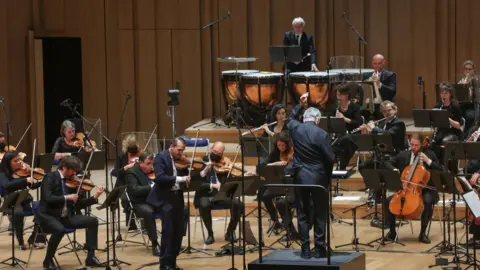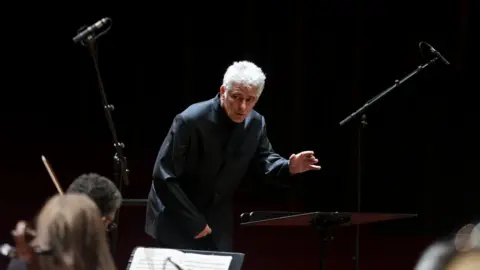Stroke recovery: Grant Llewellyn returns to conduct his orchestra
When the conductor Grant Llewellyn had a stroke last summer, it was not a sudden attack, as you might expect - more of a "funny feeling" to start.
But the impact was no less dramatic, leaving him at first hardly able to walk or carry out basic tasks without help.
Here he shares his story and explains how he has worked to return to conducting and why.
"I was out mowing the lawn - I felt just a passing weakness in my right leg, eventually my right hand also felt funny. I finished mowing the lawn and then went for a cycle ride - 10 kilometres or so - but not feeling quite right," said Grant.
Later that evening the 60 year old, who lives in Dinas Powys, Vale of Glamorgan, went to hospital.
It took three days for his symptoms to stop getting worse and many scans to confirm he had had a stroke.
"It was quite frightening - it being so gradual. It was almost that I didn't dare go to sleep in hospital because I knew that waking up, I'd have lost further control of my arm and leg. Where would it end?" he said.
According to the Stroke Association, around 8,000 people in Wales will have a stroke every year with 69,000 stroke survivors living here.
 Laurent Guizard / Orchestre National de Bretagne
Laurent Guizard / Orchestre National de BretagneAfter a month in the stroke unit in nearby Llandough Hospital, Grant returned home.
The six months that followed were a "severe learning curve" in managing his expectations of recovery.
"The physiotherapists were concerned that I wouldn't hurt myself - not that I would ever conduct again," he said.
As his rehabilitation has progressed, mobility in Grant's right leg has increased and his right arm has also improved - but not to the point that he could hold a baton to conduct.
"So at that stage, I had to come to terms with what would it mean, as a conductor, to only have use of my left arm, probably without a baton and anything else that's left to me.
"And that's where I am now, it's a voyage of discovery."
Since March, Grant has been back working with his orchestra in France, L'Orchestre National de Bretagne, finding out what is possible.
He recently conducted an hour and a half concert - including technically difficult pieces like Beethoven's Symphony No 5.
"I didn't know if I would be able to stand up to conduct. I was also anxious to know what I would do with my right arm and whether I would be self conscious about it.
"Once I got on the rostrum, I didn't think about it. You're in the music.
"I have navigated Beethoven, Haydn, Mozart and I don't see that there are technical limitation to just using the left hand."
But the reality of what has happened can hit home unexpectedly.
"The irony of my situation is that I can conduct Beethoven symphonies but I can't get out of bed. I can't tie my shoelaces."
 Laurent Guizard / Orchestre National de Bretagne
Laurent Guizard / Orchestre National de BretagneThe emotion is clear as Grant said this - he is, as he admits, "still coming to terms" with his stroke.
Now in Grant's room at home, alongside the piano, musical scores and photographs of him conducting around the world are the things he uses for physio - a rowing machine, exercise bike and electrodes.
It is clear the journey is not yet over and Grant said he knew his recovery would "not be 100%".
But with a full diary of engagements from September, Grant is focusing on what he can do and the joy of making music again.
